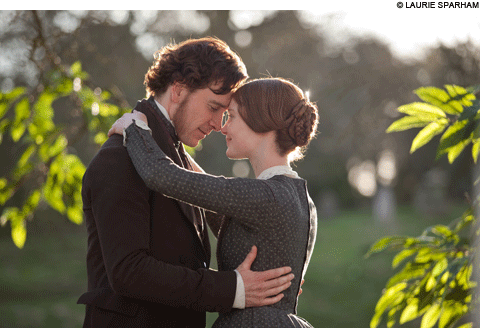
BACK TO BASICS Mia Wasikowska and Michael Fassbender skip the histrionics as they build a relationship. |
Is there a novel that's been adapted by the movies and television more often than Charlotte Brontë's chick-lit classic, Jane Eyre? We've had theatrical releases starring Virginia Bruce and Colin Clive (1934), Joan Fontaine and Orson Welles (1943), and Charlotte Gainsbourg and William Hurt (1996). And a pair of TV-movies, with Susannah York and George C. Scott (1970) and then Samantha Morton and Ciarán Hinds (1997). Not to mention three TV mini-series from the BBC (1973, 1983, and 2007). No Jane Austen novel, not even Pride and Prejudice, has enjoyed such loving attention. Now BBC Films is adding a fourth theatrical version to the list, and though director Cary Fukunaga (previous feature: Sin Nombre) and stars Mia Wasikowska (Alice in Wonderland, The Kids Are All Right) and Michael Fassbender (Inglourious Basterds, Centurion) are hardly household names, it might well be the best of the lot.
You could argue, of course, that every generation re-creates Brontë's novel in its own image. Since Bruce showed up as a platinum blonde in diamonds and deshabille, Jane Eyre adaptations have gotten progressively plainer and closer to the spirit of the original. And no Jane has been as plain as Wasikowska, who, without benefit of make-up, stares into the camera wide-eyed and humble, as if the 20th century hadn't existed yet, never mind the 21st. Fukunaga starts his version in medias res, Jane fleeing Thornfield, a speck on the misty moors, stranded at a muddy crossroads, sitting on a rock in a downpour, humanity at the mercy of the elements, the universe, St. John Rivers. Once she's settled into Marsh End, we begin to see her story in flashback: orphan cast out by her Aunt Reed, brutal education at charity school Lowood, happy employment as governess at Thornfield by Edward Rochester, marriage to Rochester aborted by the discovery that he already has a wife.
Otherwise, this film, like its star, keeps things simple. Screenwriter Moira Buffini (Tamara Drewe) pays tribute to her source by doing less rather than more. Thornfield looks almost mediæval, its great stone interior seemingly shot in nothing but daylight, firelight, and candlelight. Dress and hairstyles are austere; the meal over which housekeeper Mrs. Fairfax gives thanks "for this Thy special bounty" is soup and brown bread. And the camera bears rapt, patient witness to the long conversations in which Jane proves her master's spiritual and intellectual equal.
Fassbender does his part by not trying to be the master of the movie; young, tough, and with no initial interest in his governess, his Rochester emerges by slow degrees. Jamie Bell is an unctuous Rivers; Judi Dench brings some heat to Mrs. Fairfax. (She also has a knockout non-Brontë line: "You must have a better one," she sighs in exasperation after Jane says all her dresses are the same.) Romy Settbon Moore's Adèle is effervescently vivacious; Sally Hawkins's Aunt Reed is hypocritically bitter. As the young Jane, Amelia Clarkson is outspoken but not entitled. Imogen Poots as Jane's apparent rival, Blanche Ingram, and Valentina Cervi as Bertha Mason Rochester have less scope than in other versions.